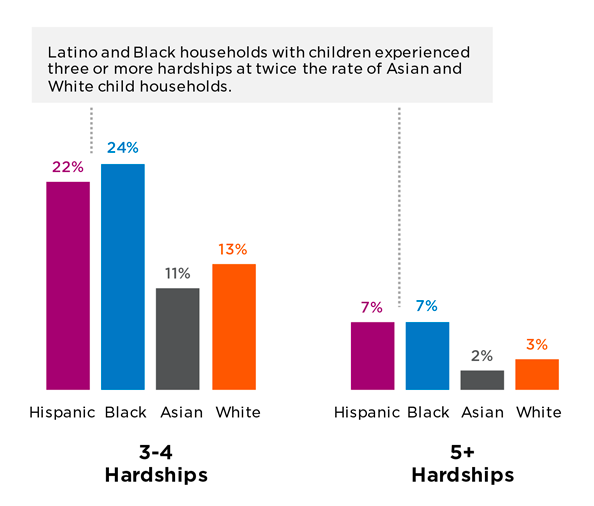As we know, the coronavirus pandemic has presented serious challenges to children all throughout the world. A new analysis of Census Household Pulse Survey data reveals that, for Latino and Black children, Covid-related hardships are twice as likely to have an impact.
According to the study, Latino and Black households with children are twice as likely to endure three or more economic and health Covid-related hardships than their white and Asian counterparts. These hardships include unemployment, difficulty paying expenses, not being caught up on rent or mortgage payments, food insufficiency, lack of health insurance, and poor physical or mental health. 29% of Latino and 31% of Black households are experiencing three or more of these hardships, compared to 13% of Asian American and 16% of white households with children.

While upon first glance these hardships may seem to be primarily endured by parents and adults, “research shows that the stress that families and parents experience definitely trickles down to their children either indirectly through parent-child interactions or by the types of experiences that they’re able to provide, or directly,” explained Dana Thomson, researcher at Child Trends and co-author of the report.
The report also reveals that racial disparities persist despite socioeconomic status. Christina Padilla, co-author of the report, pointed out that “a lot of people might think, when they first look at those numbers, that Black and Latino families are more likely to experience all these risks because they’re more likely to be low-income.” However, trends across low-income families only still reveal that these disparities, though smaller, persist for Latino and Black households. “It suggests to us that these inequalities are not just income-based, but that there are other factors that are contributing to those disparities,” said Padilla.
Unemployed Latino and Black workers, for example, are less likely than their white counterparts to receive unemployment insurance benefits, and more likely to have little to no access to banks, which can in turn burden their access to Covid relief funds. Additionally, immigrant and undocumented families face other barriers in accessing resources, services, and relief. Vaccination rates among Latino and Black communities are also trailing that of their white counterparts, even though they are at a higher risk of getting and dying from the disease. While states and the federal government work to mitigate the challenges of the pandemic, Latino and Black families with children are more likely to fall through the cracks. “There’s a need for more integrated services,” Padilla said, “we need to make it easier for families to apply to get these kinds of support.”
